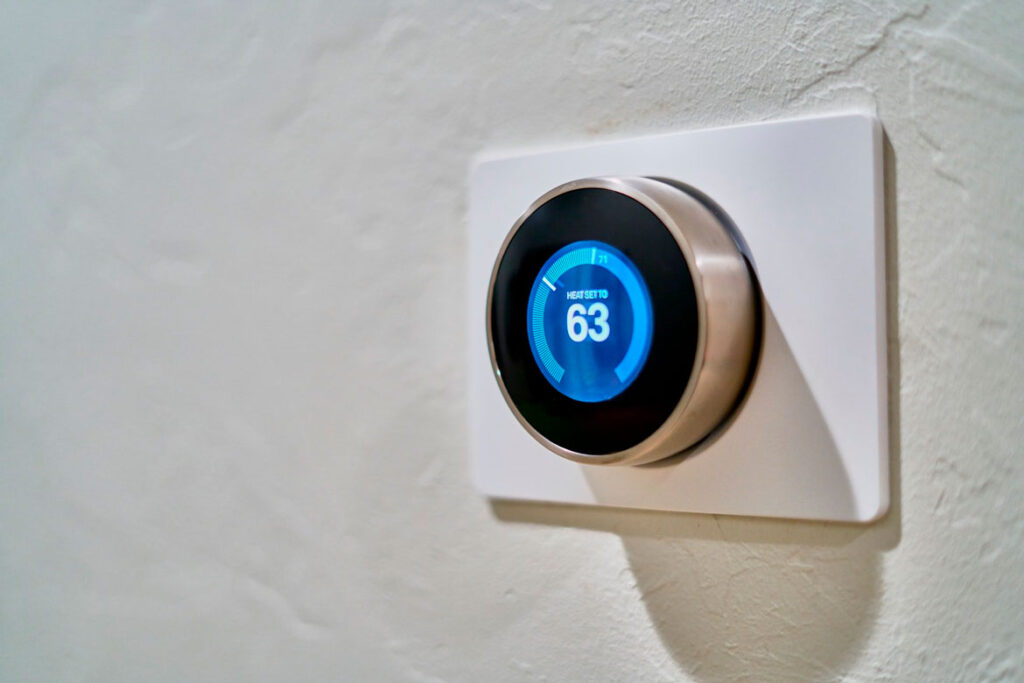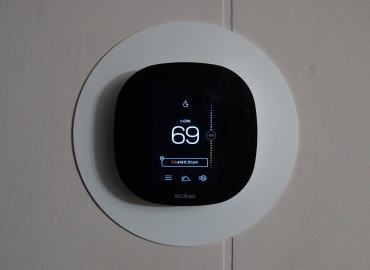10 Tips That Will Help You Save Money on Your Heating Bill
Are you tired of watching your heating bill soar during the winter months? Do you want to find ways to reduce your energy usage and save money on heating bills? Look no further!
From simple changes like using a programmable thermostat, to more significant upgrades like sealing and insulating your home, there are many ways to reduce your energy usage and lower your heating bill.
10 Tips To Save On Your Heating Bills
1. Insulating your home properly
Insulating your home is one of the most effective ways to save money on heating. Proper insulation helps to keep heat inside your home, reducing the amount of energy needed to maintain a comfortable temperature.
Proper insulation is important because it helps to reduce heat loss in your home. Heat naturally flows from warm areas to cold areas, and without proper insulation, this heat can escape through walls, ceilings, and floors. By insulating your home, you can reduce heat loss and keep your home warm and comfortable, even on the coldest days.
To identify areas that need insulation, you should first assess your home’s current insulation levels. Check the attic, walls, floors, and any other areas that may be vulnerable to heat loss. If you can see visible cracks, gaps, or holes, these are areas that need to be insulated. You can also use a thermal imaging camera to detect heat loss and identify areas that need insulation.
2. Using draft stoppers
Draft stoppers are an inexpensive and effective solution to reduce heat loss in your home, helping you save money on heating. They are designed to block air leaks around doors and windows, keeping warm air inside and cold air outside. Here’s what you need to know about using draft stoppers to save money on heating bills.
Draft stoppers are simple devices that are placed around doors and windows to prevent air leaks. They are typically made of flexible materials, such as foam or fabric, and are designed to fit snugly around the gaps between the door or window frame and the floor or wall. By blocking air leaks, draft stoppers keep warm air inside your home, reducing the amount of energy needed to maintain a comfortable temperature.
Using draft stoppers can help you save money on heating in several ways.
- They prevent air leaks. draft stoppers reduce the amount of heat loss in your home, which means you can keep your home warm and comfortable with less energy consumption.
- They are easy and inexpensive to install, making them a cost-effective solution to reduce your heating costs.
- They are an environmentally-friendly solution, as they help reduce energy consumption and greenhouse gas emissions.
When choosing draft stoppers, consider the size and shape of your doors and windows, as well as the materials used to make the draft stoppers. For example, foam draft stoppers are more affordable, but may not be as durable as fabric draft stoppers. Additionally, consider the location of the draft stopper, as some may be more effective in certain areas, such as around doors that are frequently opened and closed.
3. Setting your thermostat
Setting your thermostat correctly is a simple but effective way to save money on heating. By adjusting the temperature in your home, you can reduce energy consumption and lower your heating bill.
Temperature control is a critical factor in reducing energy consumption and lowering your heating bill. By adjusting the temperature in your home, you can ensure that it remains warm and comfortable while using the least amount of energy possible. Setting your thermostat correctly can help you save money on heating by reducing energy consumption.
The ideal temperature setting for saving money on heating varies depending on several factors, including the time of day, the weather, and your personal preferences. During the day, when you are awake and active, a temperature of 68-72°F is recommended. At night, when you are sleeping, you can lower the temperature to 55-60°F to reduce energy consumption. Additionally, consider using a programmable thermostat, which allows you to set different temperature settings for different times of the day, so you can reduce energy consumption when you are not home.
4. Sealing air leaks
Sealing air leaks in your home is a simple and effective way to reduce heat loss and save money on heating. Air leaks are gaps or cracks in the structure of your home that allow warm air to escape and cold air to enter. By sealing these leaks, you can reduce energy consumption and lower your heating bill.
Air leaks can significantly impact your heating costs by allowing warm air to escape and cold air to enter your home. This can result in higher energy consumption, as your heating system has to work harder to maintain a comfortable temperature. Additionally, air leaks can also increase the risk of indoor air quality problems, such as mold growth and moisture buildup. Some of the most common sources of air leaks include:
- Window and door frames
- Electrical outlets and switch plates
- Fireplaces and chimneys
- Attic and crawl space vents
- Baseboards and crown molding
- Investing in Energy-Efficient Windows and Doors
5. Using heavy curtains
Using heavy curtains is a simple and effective way to save money on heating by reducing heat loss and improving insulation. Heavy curtains can help trap warm air inside your home, reducing the need for heating and lowering your energy bills.
Heavy curtains are made from thick, insulating materials, such as wool, velvet, or flannel, that can trap warm air inside your home. When closed, heavy curtains can help prevent cold air from entering and warm air from escaping, improving insulation and reducing heat loss.
Using heavy curtains offers a number of benefits, including:
- Improved insulation: Heavy curtains can help improve insulation by trapping warm air and reducing heat loss.
- Lower heating costs: By improving insulation, heavy curtains can lower your heating bill and save you money on heating.
- Increased comfort: Heavy curtains can improve the overall comfort of your home by reducing drafts and controlling temperature.
6. Closing vents in unused rooms
Closing vents in unused rooms is a simple and effective way to save money on heating by reducing energy waste and improving heating efficiency. By closing the vents in rooms that are not being used, you can reduce the amount of heated air that is being sent to those rooms, lowering your heating bill and improving the overall efficiency of your heating system.
This works by reducing the amount of heated air that is being sent to those rooms. By closing the vents, you can redirect the heated air to rooms that are being used, improving heating efficiency and reducing energy waste.
Closing vents in unused rooms offers a number of benefits, including:
- Improved heating efficiency: By redirecting heated air to rooms that are being used, closing vents in unused rooms can improve the overall efficiency of your heating system.
- Lower heating costs: By reducing energy waste, closing vents in unused rooms can lower your heating bill and save you money on heating.
- Increased comfort: By redirecting heated air to rooms that are being used, closing vents in unused rooms can improve the overall comfort of your home.
7. Installing a smart home thermostat
Installing a smart home thermostat is a great way to save money on heating by improving heating efficiency and reducing energy waste. A smart home thermostat can help you control your heating system more effectively, reducing your heating bill and saving you money on heating.
A smart home thermostat works by using advanced technology to control your heating system. With features such as remote access, programmable schedules, and temperature monitoring, a smart home thermostat can help you save money on heating by reducing energy waste and improving heating efficiency.
Installing a smart home thermostat offers a number of benefits, including:
- Improved heating efficiency: With advanced technology, a smart home thermostat can help you control your heating system more effectively, reducing energy waste and improving heating efficiency.
- Lower heating costs: By improving heating efficiency, a smart home thermostat can lower your heating bill and save you money on heating.
- Increased comfort: With features such as programmable schedules and remote access, a smart home thermostat can improve the overall comfort of your home.
8. Servicing your heating system annually
Servicing your heating system annually is a crucial step in saving money on heating. Regular maintenance can help ensure that your heating system is operating efficiently and effectively, reducing energy waste and lowering your heating bill. Here’s what you need to know about servicing your heating system to save money on heating.
Regular maintenance of your heating system offers a number of benefits, including:
- Improved efficiency: A well-maintained heating system operates more efficiently, reducing energy waste and saving you money on heating.
- Increased lifespan: Regular maintenance can help extend the lifespan of your heating system, reducing the need for costly repairs or replacements.
- Enhanced comfort: A well-maintained heating system delivers consistent, reliable heating, improving the overall comfort of your home.
During a heating system service, a technician will perform a thorough inspection of your heating system to identify any potential problems or areas for improvement. This may include cleaning and tightening components, checking and adjusting the system’s settings, and testing its overall performance. For Furnace repair and service in Toronto call Smilehvac for the most efficient work in the city.
9. Upgrading to a more efficient heating system
If your heating system is old and outdated, upgrading to a more efficient model may be the best way to save money on heating. Newer heating systems are designed to use energy more efficiently, reducing waste and lowering your heating bill. Here’s what you need to know about upgrading to a more efficient heating system to save money on heating.
Upgrading your heating system offers a number of benefits, including:
- Increased energy efficiency: Newer heating systems are designed to use energy more efficiently, reducing energy waste and lowering your heating bill.
- Improved comfort: A more efficient heating system delivers consistent, reliable heating, improving the overall comfort of your home.
- Enhanced safety: Newer heating systems are designed with safety features that can help prevent fires and other hazards.
10. Using Alternative Heating Sources
Using alternative heating sources, such as wood stoves, fireplaces, or space heaters, can be a cost-effective way to save money on heating. These alternative sources can be used to supplement your primary heating system or as a backup during power outages.
Using alternative heating sources offers a number of benefits, including:
- Cost savings: Alternative heating sources can be more cost-effective than traditional heating systems, reducing your heating bill.
- Increased comfort: Alternative heating sources can provide supplemental heat, improving the overall comfort of your home.
- Emergency preparedness: Alternative heating sources can be used as a backup during power outages, ensuring that you have heat in an emergency situation
Wrapping up
Making changes to your heating habits can not only save money on heating but also benefit the environment. Implementing these 12 tips is a great way to start reducing your energy usage and saving money on your heating bill. From investing in a programmable thermostat to performing regular maintenance on your heating system, there are many simple and effective ways to make your home more energy-efficient. So why not start today and enjoy a warm, comfortable home while also reducing your monthly expenses!









